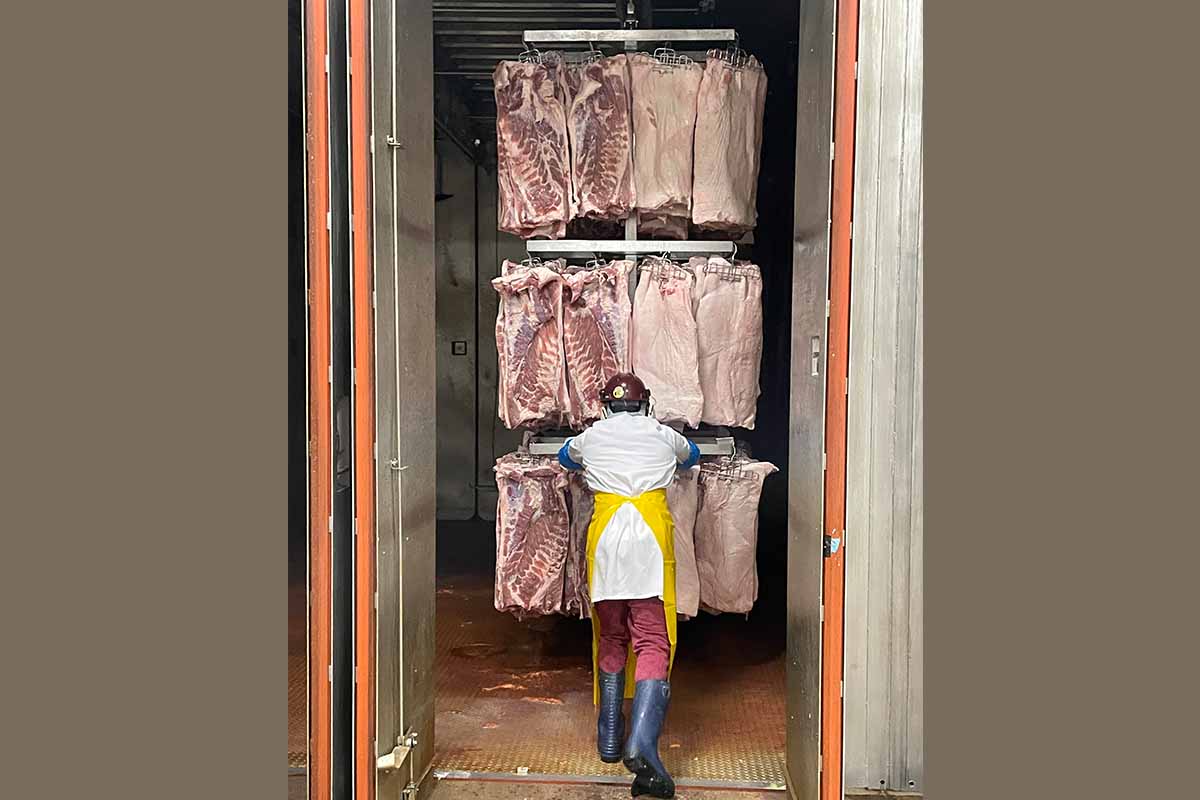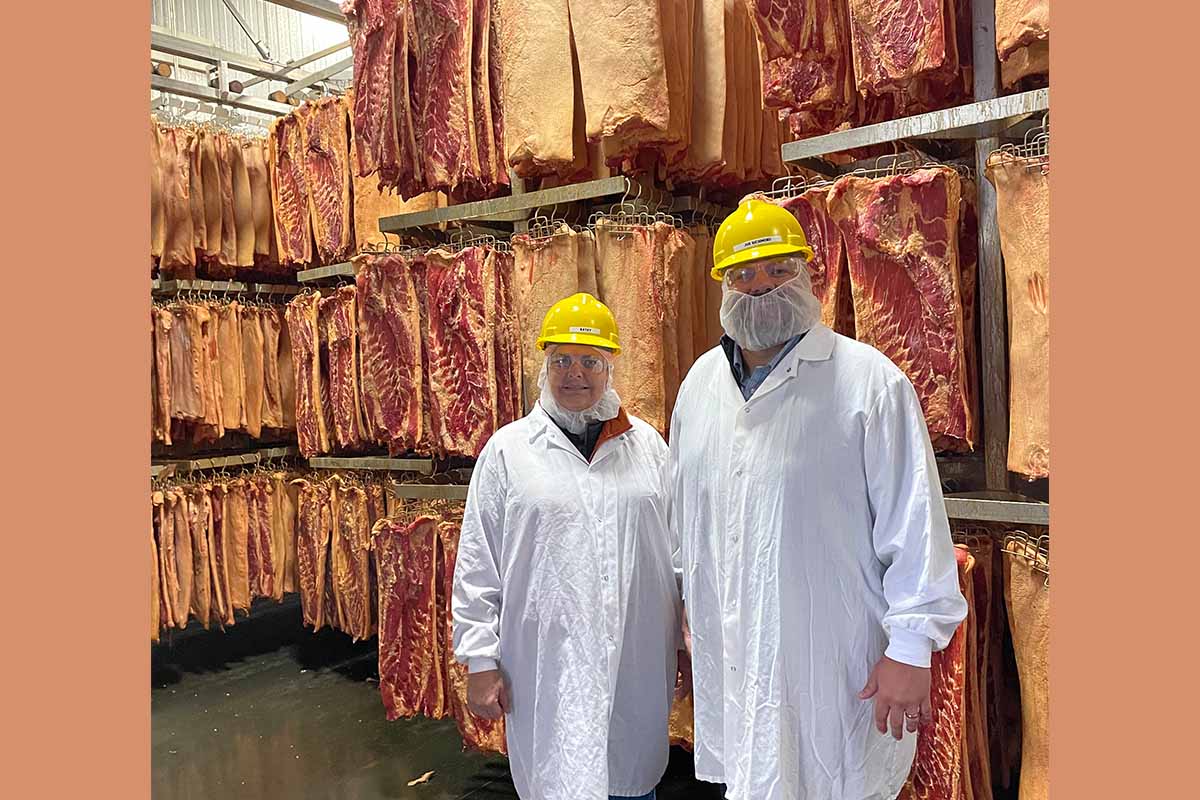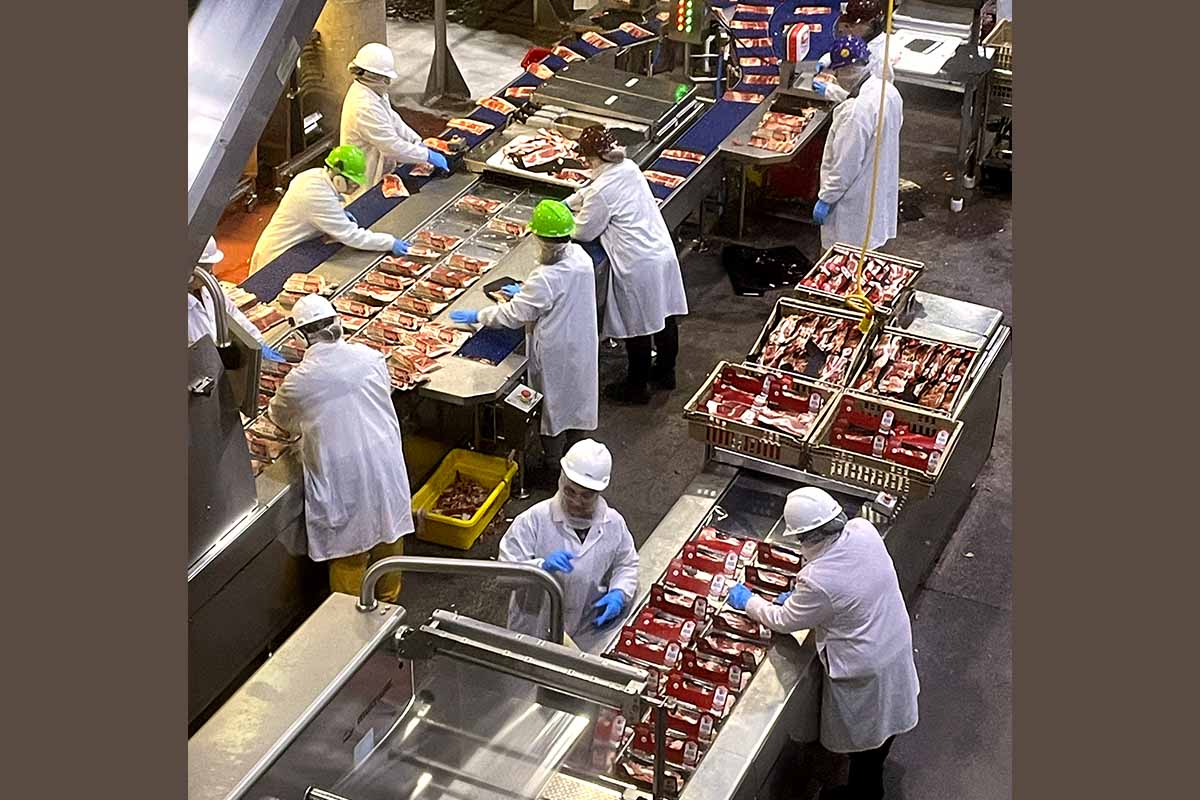It’s been an eventful six-plus years since the ribbon was cut on the new 115,000-square-foot Daily’s Premium Meats bacon plant in Saint Joseph, Mo. Besides dealing with a global pandemic that sent the entire meat industry reeling, the production focus at the new plant shifted from the original plan while a new sales strategy is expanding Daily’s brand nationally. In the past two years, leadership changes at the plant were made as demand for products has continued to soar and stakeholders make plans for expanding the plant in the next two years.
About a year ago, Joe Richmond transitioned from his role as chief financial officer at Daily’s to general manager. He joined the company in 2021 after working as a controller with Tyson Foods Inc., for over two years. Another new leadership addition was in 2022, when Kathy Berry was appointed plant manager. In 1994, Berry started as a production line worker at the Daily’s plant in Missoula, Mont., and worked her way up the ranks to plant manager there in 2021 before transferring to the Missouri plant about a year later.
The focus of the plant’s production from primarily foodservice at the outset to mostly retail was an opportunity to consolidate the fresh pork sales team and the Daily’s sales crew. The combined team is led by Chad Groves, senior vice president of global sales, marketing and innovation with Merriam, Kan.-based Seaboard Foods, which jointly owns Daily’s along with Triumph Foods, also based in Saint Joseph, just a stone’s throw from Daily’s. The new structure has simplified the sales of products and will streamline the process of selling new products in the future. Groves said it creates one unified sales pitch and one sales relationship to manage for products sold to retail or foodservice customers.
Shifting focus
Initially the plan was to start out with two foodservice processing lines when the Daily’s plant first opened and add four more of those lines as demand grew.
“Foodservice is what had been 95-plus percent of Daily’s business and we built this facility to extend that,” Richmond said. “Pretty quickly after the facility was built, we saw an opportunity to grow in retail,” which had previously been somewhat of an afterthought, he said. “Instead, we installed four retail slicing lines.”
 Bacon production volume at Daily's topped 60 million lbs in 2022. (Source: Daily's Premium Meats)
Bacon production volume at Daily's topped 60 million lbs in 2022. (Source: Daily's Premium Meats)Historically, Seaboard and its fresh pork products have been stronger in retail and the smallest part of the customer mix was in foodservice. Meanwhile, Daily’s 130-year history is rooted in foodservice, with less emphasis on retail. But that has changed significantly.
“The retail business has really been the focus for us over the last three years,” Groves said. “That’s where it made for a really nice marriage between the two teams to be able to overlap and leverage the relationships we had on both sides.
“It’s been a really nice harmony for us,” Groves said of the combined sales efforts. “So now, the team has leverage across all those platforms and all six plants,” which include Daily’s three plants, Seaboard Foods’ plant in Guymon, Okla., Triumph Foods’ facility and Seaboard Triumph Foods (STF) based in Sioux City, Iowa.
Unchanged
While certain aspects of the business have changed, one important factor that has remained constant is the growing demand for Daily’s branded premium bacon and the dozens of retail and foodservice customers the company co-packs for.
Another constant is that Daily’s production, which topped 60 million lbs of raw bacon at the Saint Joseph plant in 2022, is still based on a sliced-to-order basis, and the ongoing point of pride is that there is no long-term warehousing or freezing of product. The plant operates two daily shifts with about 400 employees working on its six processing lines. When the blueprints for the new Daily’s plant were drawn up, the plan was to intentionally overbuild to allow for plenty of growth.
“What we’re experiencing now is we’re starting to hit our head on that growth, and so we looked at where’s the next bigger bite of the apple?” Richmond said.
Pivoting to a retail-focused production model meant maintaining six lines (including two for foodservice), but also accommodating for the inherent additional square footage needed for retail versus the smaller footprint required for foodservice bacon production.
“What you’ll see when we walk the floor is we actually put holes in some of the walls and took our boxing [process] out in the hallway beyond the slice room,” Richmond said of the seam-bursting growth. “We had to get innovative based on where the product mix came and the demand we’ve had for the Daily’s brand.”
With co-packing making up about half of its production, the Daily’s branded retail product portfolio includes various flavor profiles in multiple sizes and packaging formats: The Original; a new Applewood Smoked Steak Cut; Applewood Smoked Thick Cut, Cherry Applewood Smoked Thick Cut; All-Natural Uncured; and its signature best seller, Honey Cured Thick Cut.
Part of the growth plan, according to Groves, is to elevate Daily’s from a regional brand to one with a national presence, similar to Seaboard Foods’ Prairie Fresh brand. And, he said that transition is succeeding. Groves pointed out that over the past four years, the Daily’s retail growth has trended at an annual growth rate of about 16%, with most of that coming from new retail customers on the East Coast. Looking ahead to the next five years, Richmond said the goal is to continue that trajectory while maintaining the established business on the West Coast. As opportunities to expand the Saint Joseph plant loom and are finalized, the ultimate goal will be to double down on Daily’s retail presence on the East Coast.
 Kathy Berry (left) recently transferred to Daily's in Saint Joseph to work as plant manager. Joe Richmond has been general manager at the plant for about one year. (Source: Daily's Premium Meats)
Kathy Berry (left) recently transferred to Daily's in Saint Joseph to work as plant manager. Joe Richmond has been general manager at the plant for about one year. (Source: Daily's Premium Meats)Expansion strategy
A grassy parcel of undeveloped acreage just behind the current plant is ripe and ready for additional plant space to accommodate more capacity, Richmond said.
“We call it the field of dreams,” he said. “So, the most logical next step would be ‘let’s build that out.’ We already have a great team established here in Saint Joe, let’s just do more under the same roof; a roof that would be expanded. That’s probably our next big bite of the apple is building that out,” and initial plans for the expansion are projected for the next two years allowing for the plant to double its current slicing and smoking capacity.
At this point nobody has ruled out the “field of dreams” expansion including some cooked operations to supplement the capacity at the Salt Lake City plant where all the cooked product is currently made.
“We’re still getting market data and seeing where and how much our brand can penetrate to make those decisions,” Richmond said.
Groves pointed out that especially with the now unified sales team, the plan is to build Daily’s as a dominant brand in the breakfast daypart, which would include diversifying into other breakfast items including ham and sausage.
“As we look into early 2024, sausage will be the first endeavor for this business to move into,” Groves said, which is just one way the company can profit from the trim that is produced versus continuing to sell much of that trim on the open market.
“We really need to move up that value chain to secure our fair share of that piece of the pie in the future,” he said.
“There is raw material that’s being produced at STF, Triumph and in Guymon that’s not being upgraded,” Richmond said, adding that the bellies produced at those plants outpace what Daily’s can use and are sold to other processors.
The challenge looking ahead, said Richmond is “How do we begin to use more bellies, use more hams, use more trim, and value it up?”
Groves added, “If you think about the capabilities and the core of this business, it’s smoking and cooking meats. The cooking takes place at Salt Lake City, but that’s really core for this business; it’s value adding.”
 Daily's produces raw bacon on its six processing lines, including two for foodservice products and four for retail customers. (Source: Daily's Premium Meats)
Daily's produces raw bacon on its six processing lines, including two for foodservice products and four for retail customers. (Source: Daily's Premium Meats)Technology matters
Along with adapting the plant to accommodate the shift to more retail production, the processing technology used for the product mix today reflects the unique requirements for various formats of the same products. Richmond said there are three different companies’ slicers (Weber, Thurne and Cashin) used on the plant’s two foodservice lines, three L-board retail lines and one stack pack line for retail customers.
Groves pointed out that bacon slicing for foodservice production must accommodate multiple package sizes while retail slicing includes shingled cuts for multiple sizes of L-board applications and stack-packed configurations.
“Each time we drop in a line we evaluate what the best technology is at that time,” Groves said, while also considering which suppliers have provided the best service historically.
Automation at the Saint Joseph plant has been a work in progress since its opening and especially after the workforce challenges posed during the COVID pandemic.
“Before it was all about throughput,” Groves said. “Now labor is a major factor in that as well. So how do you balance those two pieces to drop in the best possible technology? And obviously if you can maximize both, that’s a win for everybody.”
Richmond agreed, “Labor is hard to find, it’s hard to keep people once you find them, so one of the guiding principles on any investment we’re making is, ‘does it reduce the headcount in the facility?’”
He looks through the lens of identifying the less value-added work that workers are doing and asking, “How do we automate so our team members are doing more engaging, value-added work.”
Automated palletizing at the plant is one of those tasks that will soon be a reality while technology from Pacproinc has already been implemented to automatically stack sheets of foodservice bacon on the Weber slicing lines. Richmond said that step alone replaced 24 workers at the Saint Joseph facility.



